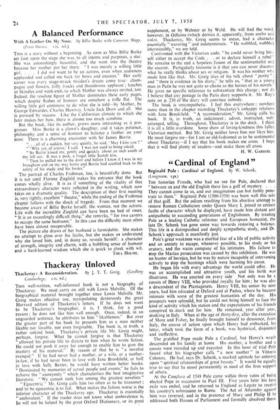A Balanced Performance
With A Feather On My Nose. By Billie Burke with Cameron Shipp.
(Peter Davies. I 25. 6d.) THIS is a story without a beginning. As soon as Miss Billie Burke set foot upon the stage she was, to all intents and purposes, a star. She was astonishingly beautiful, and she went into the theatre because her mother put her there. " I was merely a willing little girl. . . . I did nor want to be an actress, even when audiences applauded and called me back for bows and encores." Her early career was every stage-struck maiden's dream come true: cham- pagne and flowers, frilly frocks and thunderous applause ; lunches at Skindles and week-ends to which Mother was always invited, too. Indeed, the resolute figure of Mother dominates these early pages, which despite flashes of humour are somehow a trifle flat. The
willing little girl continues to do what she is told—by Mother, by George Edwardes, Charles Hawtrey, Uncle Jack Drew and all. She is pursued by success Like the Californian climate to which she later makes her bow, there is almost too much sunshine.
But the book, like its author, grows more interesting as it pro- gresses Miss Burke is a clown's daughter, and it takes patience, philosophy and a sense of humour to balance a feather on your Dose. There is a charming encounter with Sir James Barrie. .. all of a sudden, but very quietly, he said, ' May I kiss you ? ' "' Why yes, of course,' I said. I was not used to being asked. "So Barrie kissed me, gently and quickly about an inch south of my left ear. It was a peck, a frugal little Scotch kiss. "Then he pulled me to the door and before I knew it I was in my brougham and on my way home and Barrie had scuttled back to the safety of his study and his books."
The portrait of Charles Frohman, too, is beautifully done. But
it is not until Florenz Ziegfeld makes his entrance that the book comes wholly alive. It is as if something of the vitality of that extraordinary character were reflected in the writing, which now takes on a dramatic quality. The description of their first meeting is, very rightly, excellent " theatre," while the ending of the Frohman chapter follows with the shock of tragedy. From that moment we become aware of Billie Burke herself, the woman, not the actress. Life with the incredible Ziegfeld can have been no bed of roses. " It is an exceedingly difficult thing," she remarks, " for two careers to occupy the same bedroom." In this Lase the difficulty must often have been almost insuperable.
The picture she draws of her husband is formidable. She makes no attempt to gloss over his faults, but she makes us understand _ why she loved him, and, in doing so, reveals hergelf: a character of strength, integrity and charm, with a bubbling sense of humour and a hard-learned wisdom which she is quick to cloak with wit.
THEA HOLME. THEA HOLME.






































 Previous page
Previous page